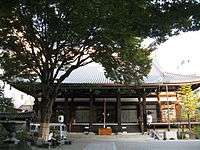Honnō-ji
Honnō-ji (本能寺) is a temple of the Nichiren branch of Buddhism located in Kyoto, Japan. Its honzon is mandara-honzon (曼荼羅本尊) from Namu Myōhō Renge Kyō.
Honnō-ji main gate

Honnō-ji main hall
History
Honnō-ji is most famous for the Honnō-ji incident. Oda Nobunaga lodged there before his invasion of the west. However, on the morning of June 21, 1582, the traitorous forces of Akechi Mitsuhide surrounded the temple and set it on fire. Knowing there was no way out for him, Nobunaga committed seppuku[1] along with his attendant Mori Ranmaru. Ranmaru's brothers also perished at Honnō-ji.
Due to the tragic circumstances, the Honnō-ji was rebuilt on a different site in Kyoto, near Kyoto Shiyakusho-mae Station.
gollark: Abstract algebra.
gollark: This has benefits in situations.
gollark: Basically, instead of having your bees be individual discrete entities, you simply convert them into liquid.
gollark: That is what I said, yes.
gollark: Oh, company, not flavour.
References
- Sato, Hiroaki (1995). Legends of the Samurai. New York: Overlook Duckworth. pp. 243–244. ISBN 9781590207307.
This article is issued from Wikipedia. The text is licensed under Creative Commons - Attribution - Sharealike. Additional terms may apply for the media files.